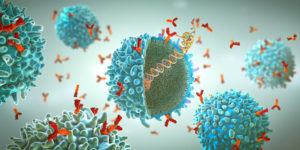 Immunotherapy is a type of treatment that increases the immune system’s ability to kill cancer cells. Many immunotherapy treatments are drugs. However, immunotherapy treatments also include adoptive cell therapies, which are immune cells modified and given to a person with cancer.
Immunotherapy is a type of treatment that increases the immune system’s ability to kill cancer cells. Many immunotherapy treatments are drugs. However, immunotherapy treatments also include adoptive cell therapies, which are immune cells modified and given to a person with cancer.
Read below for introductions to immunotherapy and adoptive cell therapy and the latest research on different types of adoptive cell therapy.
Introductions to Immunotherapy and Adoptive Cell Therapy
- Breastcancer.org: Immunotherapy
- Cancer Research Institute: Adoptive Cell Therapy
 Chimeric Antigen Receptor (CAR) T-Cell Therapy
- American Cancer Society: CAR T-Cell Therapy
- Fred Hutchinson Cancer Center: Targeting MBC with CAR T-Cell Immunotherapy
- City of Hope: Breast Cancer CAR T-Cell Therapy
- Dr. Susan Love Foundation (Video): CAR-T Therapy in Breast Cancer
- Current clinical trials: MBC Trials for CAR T-Cell Therapy
- Current clinical trials: MBC Trials for T-Cell Therapy
 T-Cell Receptor (TCR) Therapy
- Moffitt Cancer Center: T-Cell Receptor Immunotherapy
- Akadeum: Comparison of TCR Therapy and CAR T-Cell Therapy for Cancer Treatment
- Current clinical trials: TCR Therapy
 Tumor-Infiltrating Lymphocyte (TIL) Therapy
- National Cancer Institute: Experimental Immunotherapy Targets MBC
- Advanced Breast Cancer: TILs for MBC Treatment (Includes a Patient’s Experience)
- Current clinical trials: TIL Therapy
 Natural Killer (NK) Cell Therapy
- Washington University in St. Louis: Natural Killer Cell Therapy
- Hoag Memorial Hospital Presbyterian (Orange County, CA): Hoag Enrolls Patients with Triple-Negative Breast Cancer in NK Cell Therapy Clinical Trial
- Current clinical trials: NK Cell Therapy
Last Modified on September 27, 2023
